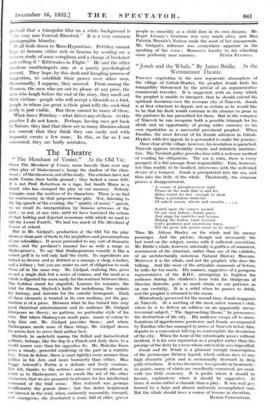" Jonah and the Whale." By James Bridie. At the
Westminster Theatre.
PIOUSLY vegetating in the now regenerate atmosphere of the village of Gittah-Hepher, the prophet Jonah finds his tranquillity threatened by the arrival of an argumentative commercial traveller. It is suggested, with an irony which the prophet is unable to interpret, that he should extend his spiritual dominion over the recreant city of Nineveh. Jonah is at first reluctant to depart, not as certain as he would like to be that his flock would continue in his absence to graze in the pastures he has prescribed for them. But in the conquest of Nineveh he can recognize both a possible triumph for his ideals and an opportunity of giving wider currency to his own reputation as a successful provincial prophet. When Euodias, the most fervent of his female admirers in Gittah- Hepher, adds her appeal, he is persuaded to make the journey.
Once clear of the village, however, his resolution is quenched. Nineveh appears incalculably remote and infinitely unattrac- tive. The Tarshish galley provides him with a welcome method of evading his obligations. The sea is calm, there is every prospect of a fair passage from responsibility. Fate, however, not thus readily to be baulked, intervenes with the well-tried device of a tempest. Jonah is precipitated into the sea, and thus into the belly of the whale. Theatrically, the cetacean proves a disappointment.
" A cream of phoiphorescent light
Floats on the wash that to and fro Slides round his feet—enough to show Many a pendulous stalactite Of naked mucus, whorls and wreaths . .
Seated upon the convex mound Of one vast kidney, Jonah prays And sings his canticles and hymns, Making the hollow vault resound God's goodness and mysterious ways, Till the great fish spouts music as he swims."
Thus Mr. Aldous Huxley on the whale and his uneasy passenger. And the picture, though not necessarily the last word on the subject, carries with it sufficient conviction. Mr. Bridic's whale, however, internally is guiltless of ornament, reminiscent of the structure, rather than one of the exhibits, of an architecturally notorious Natural History Museum. Moreover it is the whale, and not the prophet, who does the talking. And like most of the articulate mammals of fiction, he talks far too much. His manner, suggestive of a pompous representative of the B.B.C. attempting to frighten his audience during the children's hour with the bludgeons of Shavian dialectic, puts as much strain on our patience as on our credulity. It is a relief when he pauses to drink, and the prophet is returned to the ocean.
Miraculously preserved for the second time, Jonah reappears at Nineveh. At a meeting of the most select women's club, where he is to deliver an address on an apparently uncon- troversial subject, " The Approaching Doom," he pronounces the destruction of the city. His audience creeps off to mani- festations of apprehensive penitence, and Jonah, accompanied by Euodias who has managed to arrive at Nineveh before him, departs to a convenient hill-top to contemplate the desolation of the city. When the hour of the catastrophe passes without incident, it is his own reputation as a prophet rather than the prestige of the deity he serves whose survival he sees imperilled.
Jonah and the Whale is a pleasant enough transcription of the picturesque Hebrew legend, which seldom rises to any high dramatic pitch and is occasionally drowned in deep gulfs of tedium. It is too discursive, too episodic in treatment : its points, many of which are excellently conceived, are made with too little economy. It is prolix where it should be laconic, explanatory where it should be suggestive. At times it seems rather a charade than a play. It was well per- formed by a large and almost uniformly accomplished cast. But the whale should have a course of lessons in elocution.
DEREK VERSCIIOYLE.






























 Previous page
Previous page